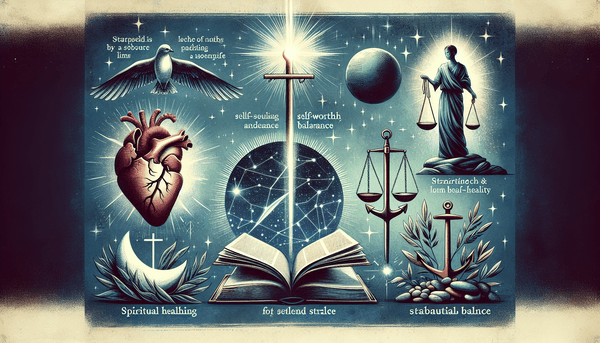Baptism and Transformation
Baptism is a significant milestone in the believer's journey, symbolizing repentance, forgiveness of sins, and the reception of the Holy Spirit. As Peter declared in Acts, 'Repent and be baptized every one of you in the name of Jesus Christ for the forgiveness of your sins, and you will receive the gift of the Holy Spirit' (Acts 2:38). This powerful act is both a declaration of a change of heart and an emblem of being buried with Christ in death and raised to walk in the newness of life (Romans 6:4). Baptism signifies the washing away of our old life and the beginning of a new chapter as followers of Christ, fully immersed in His grace and love. Just as our personal faith journey is transformed through baptism, our interpersonal relationships can also be renewed through embracing Biblical principles, fostering connections that reflect divine love and righteousness.
Salvation Through Faith in Jesus Christ
Salvation lies at the heart of the Christian faith, and it is through Jesus Christ alone that we are reconciled to God. The exclusivity of Christ as the path to salvation is clearly stated by Jesus Himself: 'I am the way and the truth and the life. No one comes to the Father except through me' (John 14:6). The apostles echoed this truth, affirming that there is no other name by which we must be saved (Acts 4:12). This salvation is not something we can earn; it is a gift of God's grace, underscoring that while we are called to live out our faith, the foundation of our salvation remains firmly in the sacrificial work of Jesus on the cross and His resurrection.
The Deity of Jesus Christ
The Christian confession that Jesus Christ is Lord is rooted in the acknowledgment of His deity. Scripture affirms that in Christ, the fullness of the deity lives in bodily form (Colossians 2:9). Recognizing Jesus as God incarnate is central to Christian belief. The concept of the Trinity—Father, Son, and Holy Spirit—while mysterious, is foundational to understanding the nature of God and the person of Christ. The deity of Christ is not merely a theological assertion but a reality that transforms how we live, worship, and relate to God. It is in confessing Jesus as Lord that we find the full expression of faith and the assurance of His presence in our lives.
Conclusion
Our exploration of Christian doctrines reveals the intricacy and depth of the faith journey. From the indwelling of the Holy Spirit to the enduring nature of salvation, the transformative symbol of baptism, the gift of grace through faith in Jesus, and the deity of Christ, each aspect offers rich insights into the believer's relationship with God. As we contemplate these truths, let us be encouraged to pursue a deeper understanding of our faith and to live out these doctrines with authenticity and devotion. For they are not just tenets to be believed but realities to be experienced and embodied in our daily walk with Christ. To further explore how biblical teachings intersect with modern life, consider reading our examination of theological and ethical questions such as the figure of Melchizedek and the Christian perspective on body modifications and feminism.
FAQ
Q: If someone accepts Christ but then does not walk a Christian life, will they still be saved?
A: Salvation is a gift from God through faith, not by works, so it cannot be lost by poor performance (Ephesians 2:8-9). However, a true faith in Christ is expected to produce a transformed life (James 2:17).
Q: Can Christians be possessed by demons?
A: The Bible teaches that believers are indwelt by the Holy Spirit (1 Corinthians 6:19-20), and this indwelling presence is believed to offer protection against being possessed by demons.
Q: What does Matthew 24:13 mean?
A: Matthew 24:13 emphasizes the importance of perseverance in faith, encouraging believers to remain steadfast in their commitment to Christ through trials and hardships.
Q: What is the significance of baptism for Christians?
A: Baptism is an outward expression of an inward change, symbolizing repentance, forgiveness of sins, and becoming part of the body of Christ. It's a step of obedience in the faith journey (Romans 6:3-4; Acts 22:16).






